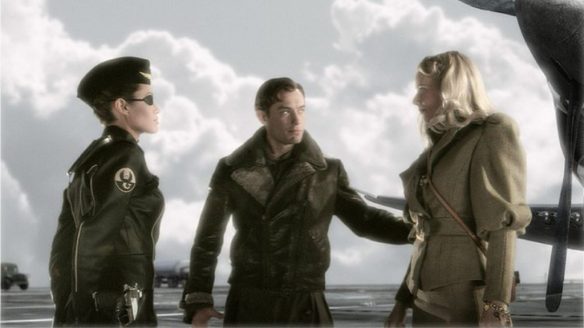Hello folks, and welcome back to Wrong Every Time. We’re still deep in the January doldrums at this point, but I’ve been keeping busy however I can, and it seems my tabletop associates are at last emerging from their hibernation and bellowing for treats. It’s significantly harder to set up DnD sessions now that we don’t share an apartment, but the spirit is willing even if the scheduling is weak. I’ve also been making good on my resolution to get back into traditional fiction this year, and have already written a short story that’d been bouncing around my head for months. Plus I’m still munching through the delightful Metaphor Refantazio, which is so good it’s actually becoming a bit of a problem in terms of getting to other projects. Nonetheless, my film viewings continue apace, and I’ve curated a fresh collection of reflections for you all to peruse at leisure. Let’s get to it!
First up this week was Sky Captain and the World of Tomorrow, an ‘04 action-adventure renowned for being one of the first films shot entirely on a digital stage. Set in a retro-futuristic world of zeppelins and metal men, the film concerns the nefarious ambitions of one Dr. Totenkopf, whose mechanical marvels are wreaking all manner of havoc in their pursuit of the ingredients for a mysterious, world-threatening project. Holding the line against this malignant mechanist are the brave Sky Captain (Jude Law), reporter Polly Perkins (Gwyneth Paltrow), and whatever allies they can muster.
Sky Captain is a fascinating artifact, a simultaneous throwback to classic cinema and bellwether of the era to come, and about as cohesive of an aesthetic statement as you can get in modern Hollywood. Its distinctive world will likely feel familiar to any fans of Giant Robo or similar anime classics, but exists entirely apart from modern Hollywood genres, and the film embraces a heightened, operatic narrative and dramatic register that feels similarly against the grain of modern Hollywood naturalism (or worse, self-aware cynicism). Its story is anthemic to the point of feeling somewhat impersonal, more concerned with presenting a series of iconic images than interrogating character or theme, but that is all in keeping with its Flash Gordon-esque presentation of aesthetic texture as substance.
It unfortunately doesn’t really work. This is no fault of the actors involved; Jude Law feels like a natural in this melodramatic mode, and Paltrow manages to find some humanity in a script that’s clearly more interested in icons than people. But Sky Captain is so preoccupied with recapturing the look of German expressionism, classic noir, and pulp serials that it seems to have forgotten their substance; its narrative is simply, “look, here’s a classic adventure serial on the big screen,” with no further hook to drive investment. It is pure pastiche, lacking a soul of its own.
That said, it’s still a compelling and somewhat melancholic artifact. Everything Sky Captain borrows from the classic era of cinema is fantastic: the cities and cinematography of Metropolis, the staging and shadows of The Third Man, the unabashed confidence of its dime paperback storytelling. Meanwhile, everything it foretells regarding the future of cinema is horrific: the lack of any physical staging and texture, the replacement of thoughtful action choreography with weightless CG noise, the prioritizing of action figures over actors or characters. Sky Captain is in love with a glorious, vanishing past, and expresses that love through the weapons of the men who killed it. An odd, infrequently successful, and exceedingly interesting film.
Our next viewing was The Tingler, a ‘59 horror film by William Castle, starring Vincent Price as a scientist who’s determined to root out the origins of the human fear response. He eventually discovers there is a parasite within all of us known as “The Tingler,” a monstrous centipede-like creature that resides within our spine, and which presents a terrible danger if ever unleashed from its natural habitat. There is only one antidote to the Tingler’s menacing jaws: to scream like you mean it, lest your fear consume you entirely.
The Tingler is classic pulp Price, offering little of notable value beyond Price’s own commanding presence as the maestro of melodrama, alongside the unintentionally charming rubber Tingler they constructed to wiggle menacingly towards its intended victims. The film was originally pitched through its employment of the “Percepto!” in-theater device, which would make seats in the theater vibrate in time with Price’s proclamations to “scream! Scream, if you want to live,” and that should offer some indication of the caliber of scares on offer here. Nonetheless, Price and his little rubber buddy are welcome on-screen presences, and though The Tingler wastes much of its runtime meandering through arbitrary familial drama, there’s enough of both Price and tingletoes here to make for an enjoyably campy watch.
We then continued our Liam Neeson investigations with Cold Pursuit, yet another in the endless string of thrillers where Neeson strives to bring order and justice to our fallen world. Here he stars as Nels Coxman, a snowplow driver who has dedicated his professional life to clearing the road connecting Denver, Colorado with the tiny town of Kehoe. When his son is murdered by a Denver drug cartel, Nels embarks on a campaign of revenge that will see bodies stacking across the state, as old cartel rivalries are stoked, and Neeson shows us just how terrifying a snowplow driver can be.
Okay, it’s not all that grim. Cold Pursuit actually possesses a welcome sense of lightness, an irreverent gaiety echoing the gallows humor of something like Fargo or In Bruges. Executions are performed with abruptness and grace, a confidence likely attributable to the film’s director Hans Petter Moland’s total understanding of the material – after all, he directed the film’s Norwegian predecessor five years earlier. Neeson kills thugs and gets up for the morning plow, all while larger, darker forces spin and panic about him.
With confident direction, a complex yet lightly executed script, and strong performances across the board, Cold Pursuit proves itself an altogether superior Neeson vehicle – in fact, it’s such a generally satisfying crime drama that it feels unfair to group it with stuff like Taken or The Commuter. With title cards cheerfully marking each death along the road, Cold Pursuit motors its way from Denver to Kehoe and back, offering a whimsical slice of crime drama macabre.
Next up was The Abyss, James Cameron’s ambitious ‘89 deep sea adventure. Ed Harris stars as Virgil Brigman, the foreman of the Deep Core, a deep-sea drilling platform used primarily for scientific research. When a navy submarine goes down nearby, a SEAL team requisitions the Deep Core and its personnel as an impromptu rescue team, with the Deep Core’s original designer/Virgil’s estranged wife Lindsey (Mary Elizabeth Mastrontonio) demanding to join them. There, within the uncharted depths of the ocean’s deepest troughs, the team will encounter wonders they never could have imagined, if only they can stay alive long enough to see them.
The Abyss is first and foremost an act of hubris by its undeterrable director. The film required a variety of technical innovations just to be filmed at all, was largely shot in a pair of specially-outfitted tubs that counted as the largest fresh-water tanks in the world, and nearly resulted in both the death of Cameron and the revolt of his cast, so sick were they of filming for hours in horrific conditions in order to hopefully get one acceptable reel of film.
The result is… okay, I guess? The Abyss is a reasonable-enough thriller that is somewhat elevated by its excellent cast, as well as its narrative commitment to fleshing out and developing the overall Deep Core family. The underwater photography is indeed spectacular, and the film occasionally crescendos into a staggering action setpiece that almost justifies its downtime and lack of focus. Unfortunately, the film’s final tricks are its weakest; the reveal of what they actually find down in the deep feels trite and saccharin, making what should be The Abyss’ strongest card into its dramatic undoing. Whatever wonder Cameron experienced in his own deep sea expeditions sadly does not transfer to his dramatization of the events.




